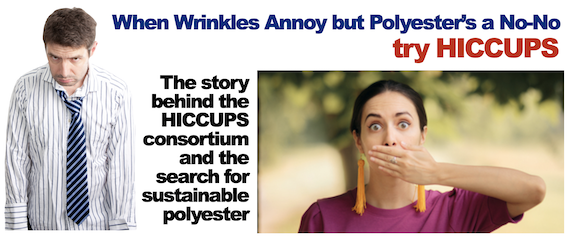When Wrinkles Annoy but Polyester’s a no-no, try HICCUPS

We love polyester, the magic molecule, the bane of wrinkled or torn shirts, friend of moisture resistance. We just can’t stand the way it’s made. In some ways, right up there with hot dogs.
Why throw out the molecule? Why not make the carbon we love from the carbon we disdain — like carbon dioxide made from dastardly pools of dairy waste, for example. If you could take terrible, terrible stuff and make it into a friendly polyester, you’re just like Mighty Mouse, here you are to save the day.
May I, along these lines, suggest HICCUPS to you?
Specifically, the HICCUPS program, which has received a €5 million EU Horizon Europe grant, will demonstrate the full value chain from biogenic CO2 to polyester end-use and is expected to be executed over four years.
The pathway?
Let’s start with PLGA (polylactic-co-glycolic acid), and if you’ve never heard of it, consider that at some stage in your yesteryears you had never heard of Taylor Swift or Tesla, either — just to put PLGA’s potential in a proper perspective.
PLGA with 80% glycolic acid or more has an excellent barrier against oxygen and moisture and good mechanical properties. It is furthermore recyclable and both home compostable and marine degradable. PLGA can be used, for example, as coating material and in moulded plastic materials. This makes PLGA an excellent alternative for fossil-based polyethylene.
But don’t think polyethylene, think polyester!
What could make PLGA sustainable. Well, try making it from biogas produced at wastewater treatment plants.
Already I am sure you are reaching for Volta technology to accomplish this. That means you’re tapping Volta’s owner, Avantium, as the leader in this effort. And you’d be right, Avantium is leading the HICCUPS consortium consisting of Avantium, and has been awarded a €1.5 million grant by the EU Horizon Europe program for its leadership role in HICCUPS.
But there’s a swath of industry and academic partners in the €5M program. So, there’s Avantium, Funditec (Spain), University of Amsterdam (Netherlands), INRAE (France), ACCIONA (Spain), Nova Institut (Germany), VTT (Finland), University of Ferrara (Italy), Tecnopackaging (Spain), Aqualung (Norway), SINTEF (Norway) and Walki (Finland).
That Avantium technology suite backstory
The company currently has three technologies at pilot and demonstration phase. The most advanced technology is the YXY plant-to-plastics–technology that catalytically converts plant-based sugars into FDCA (furandicarboxylic acid), the key building block for the sustainable plastic PEF (polyethylene furanoate). Avantium has successfully demonstrated the YXY Technology at its pilot plant in Geleen, the Netherlands, and has started construction of the world’s first commercial plant for FDCA in 2022, with planned large-scale production of PEF in 2024.
The second technology is Ray Technology and catalytically converts industrial sugars to plant-based MEG (mono-ethylene glycol) and plant-based MPG (mono-propylene glycol): plantMEG and plantMPG. Avantium is scaling up its Ray Technology and the demonstration plant in Delfzijl, the Netherlands opened in November 2019. The third technology is called the Dawn Technology that converts non-food biomass into industrial sugars and lignin in order to help transition the chemicals and materials industries to non-fossil resources.
In 2018, Avantium opened the Dawn Technology pilot biorefinery in Delfzijl, the Netherlands. Avantium also provides R&D solutions in the field of sustainable chemistry and is the leading provider of advanced catalyst testing technology and services to accelerate catalyst R&D. Avantium works in partnership with like-minded companies around the globe to create revolutionary renewable chemistry solutions from invention to commercial scale.
Reaction from the stakeholders
Annelie Jongerius, Technology Manager at Avantium and scientific coordinator of HICCUPS: “Avantium is proud to lead the development of CO2-based polyesters and we look forward to working with like-minded organizations on Carbon Capture and Utilization under the HICCUPS program. This award of the prestigious European Horizon grant reflects our expertise in the conversion of CO2 into high-value polyesters using electrochemistry and our ability to develop innovative new materials.”
This project has received funding from the Circular Bio-based Europe Joint Undertaking under the European Union’s Horizon Europe funding program under grant agreement No 101112455.
The Bottom Line
Guilt-free polyester? Well, that’s a worthy goal. If we get there, we can stop worrying as much about wastewater, and unsustainable polyester. ANd get back to important tasks like worrying about wrinkles. We’re stoked by the idea.
Category: Top Stories















